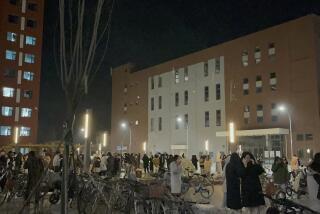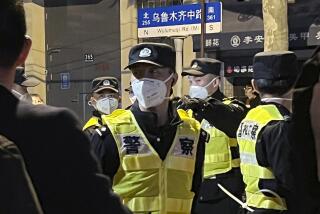Blasts Rock Chinese Mill Dormitories; at Least 18 Die
- Share via
BEIJING — A series of predawn explosions ripped through workers’ dormitories in a provincial capital Friday, killing at least 18 people and potentially dozens more, Chinese state media and residents said.
Local television in Shijiazhuang, about 170 miles southwest of here, reported that the blasts were deliberately caused, the semiofficial China News Service said. The separate New China News Agency, the country’s official news service, said the investigation was continuing.
A five-story dormitory attached to Cotton Mill No. 3 was flattened by one of the blasts, trapping residents in mounds of rubble, neighbors said by telephone. By early evening Friday, only 28 people had been rescued from the ruins of the crumbled building, which was home to 170 people, a Hong Kong human rights group reported.
Explosions also reportedly ripped through dormitories at another cotton mill and a railroad company, causing no deaths, few injuries and far less damage. Shijiazhuang has been the site of extensive layoffs.
The textile industry has been one of the economic mainstays of Shijiazhuang, a city of about 1.2 million. In recent years, many of the factories have fallen on hard times, shedding workers by the thousands as China’s market-oriented reforms took hold.
Today’s noontime newscast by China Central Television offered no updated death toll, but the network did air footage of rescue workers digging through the ruins of an apartment building. At another site, nearly half of a dormitory had sheared away, exposing the jagged-edged rooms that remained.
Wang Zhongyu, secretary-general of China’s Cabinet, toured the blast sites and said authorities would “make every effort to crack the case . . . [and] rescue survivors as long as there’s a glimmer of hope.”
The explosions came less than two weeks after a schoolhouse in the southern province of Jiangxi blew up, killing at least 42 people, most of them young students who residents said were forced to assemble firecrackers in their classrooms. That incident sparked outrage across the nation and elicited a rare apology from Premier Zhu Rongji this week for the Communist government’s failure to prevent the tragedy.
Friday’s blasts in Shijiazhuang, the capital of Hebei province, started about 4 a.m. and were spread over about an hour, the Associated Press reported.
“There were two big noises, with several seconds between them,” said a resident awakened by the blasts. He spoke by telephone and declined to give his name. “I thought it was an earthquake. I went out to look but didn’t see anything.”
“A lot of people heard it. We’re on the next street over,” said another man, who gave his surname as Zhang. “All the windows rattled.”
The Information Center for Human Rights and Democracy, a Hong Kong-based organization, said four separate residential buildings were hit by separate explosions; three of the buildings housed workers from various cotton mills around Shijiazhuang.
By noon, as word of what occurred trickled through the city and beyond, swarms of armed police had sealed off the sites, residents said. The rights group reported that local officials ordered hospitals off limits to reporters, and reporters arriving in the area from Beijing were turned back.
Throughout China, mass protests over lost jobs, unpaid wages, dried-up pensions and local corruption have become common as inefficient public enterprises, long propped up by state loans, go under. In addition, the decline of cradle-to-grave welfare has left millions of urban workers struggling to stay afloat, often on basic government subsidies amounting to less than $30 a month. The Communist regime thus views labor unrest as one of the primary potential sources of instability.
Many of the labor demonstrations are resolved peacefully as local officials mollify protesters with stopgap measures. But protests occasionally boil over into violence. In February 2000, thousands of miners in the northeastern town of Yangjiazhangzi were reported to have rioted, setting cars on fire and shattering windows before police and soldiers ended the violence. The miners were upset over mass layoffs and alleged corruption.
Hebei province lies at the edge of China’s hard-hit Rust Belt. Rumors circulated Friday that a laid-off worker--or workers--was responsible for the blasts in Shijiazhuang. Several residents expressed anger over the explosions.
“If you’ve got problems, then go tell the proper authorities. Don’t take it out on the people,” one woman, who works for a local pharmaceutical company, said by telephone. “Everybody’s getting laid off. You can’t go out and hurt innocent folks.”
The country in general and Shijiazhuang in particular have been no strangers to violence stemming from economic dislocation or political discontent. Explosives are often the weapons of choice in a land where access to the necessary materials is not heavily restricted.
Last September, a Hong Kong newspaper reported that three explosions in as many days rocked Shijiazhuang, killing three or four bystanders and injuring a few others. The blasts occurred in the run-up to China’s National Day on Oct. 1. The man believed to be responsible was arrested and executed.
“Public safety is a shambles,” resident Zhang said. “Average citizens are extremely upset. We hope they can solve this [latest incident] quickly.”
“We’ve been thinking about last year’s bombings and now this one,” said another resident, a woman also surnamed Zhang, who lives in a dormitory belonging to Cotton Mill No. 2. “We’re frightened. . . . If you’re not safe at home, then where are you safe?”
Other speculation about the cause of the blasts touched on retaliation against official corruption, a reprisal by angry followers of the Falun Gong spiritual movement and even the involvement of Chinese gangsters.
The Beijing regime blamed last week’s schoolhouse explosion in Jiangxi province on a madman who officials said went into an elementary school in Fanglin village and blew himself up.
But both domestic and foreign media contradicted that version of events after interviewing parents in the area who said their children had been forced to spend time in class assembling firecrackers so the school could earn extra money.
Those reports spread despite efforts by local officials to shut out journalists and control information. Ultimately, the controversy over the varying explanations led to an uncharacteristic softening of the official line on the tragedy.
During Thursday’s nationally televised news conference, Premier Zhu stuck to the government’s explanation but promised to get to the truth of what happened and apologized for not having done enough to prevent the explosion.
After Friday’s explosions in Shijiazhuang, media access was restricted, and the Web sites of two local newspapers, the Shijiazhuang Daily and the Hebei Daily, today carried only the official New China News Agency account of what happened.
But in perhaps an allusion to the controversy after the Jiangxi explosion, Wang, the Cabinet secretary, told a victim of the Shijiazhuang blasts: “President Jiang Zemin and Premier Zhu Rongji are very concerned with the tragic explosions. I came here . . . to reassure you that the aftermath will be properly handled.”
More to Read
Sign up for Essential California
The most important California stories and recommendations in your inbox every morning.
You may occasionally receive promotional content from the Los Angeles Times.














